BUSM3127 Managing Across Cultures: Intercultural Communication Essay
VerifiedAdded on 2022/10/12
|13
|3370
|306
Essay
AI Summary
This essay delves into the critical role of intercultural communication in today's globalized business landscape, emphasizing the challenges managers encounter when navigating diverse cultural contexts. It explores how cultural differences in language, beliefs, and behaviors can create barriers to effective communication and hinder organizational success. The essay highlights the importance of developing intercultural competence, including self-awareness, cultural knowledge, and effective communication skills. It examines the impact of cultural dimensions, communication styles, and the loss of interpersonal communication in cross-cultural settings. Moreover, it discusses the opportunities that effective intercultural communication offers, such as accessing new markets and resources, making better decisions, and building strong relationships. The essay also compares cultural aspects between Australia and Asian countries, providing insights into how these differences impact management strategies. Furthermore, the essay emphasizes the need for managers to develop skills in listening, non-verbal communication, and cultural sensitivity. Finally, it concludes with a reflection on the importance of cross-cultural communication for career growth, highlighting the benefits of proactive decision-making, building trust, and navigating cultural complexities to achieve global leadership.
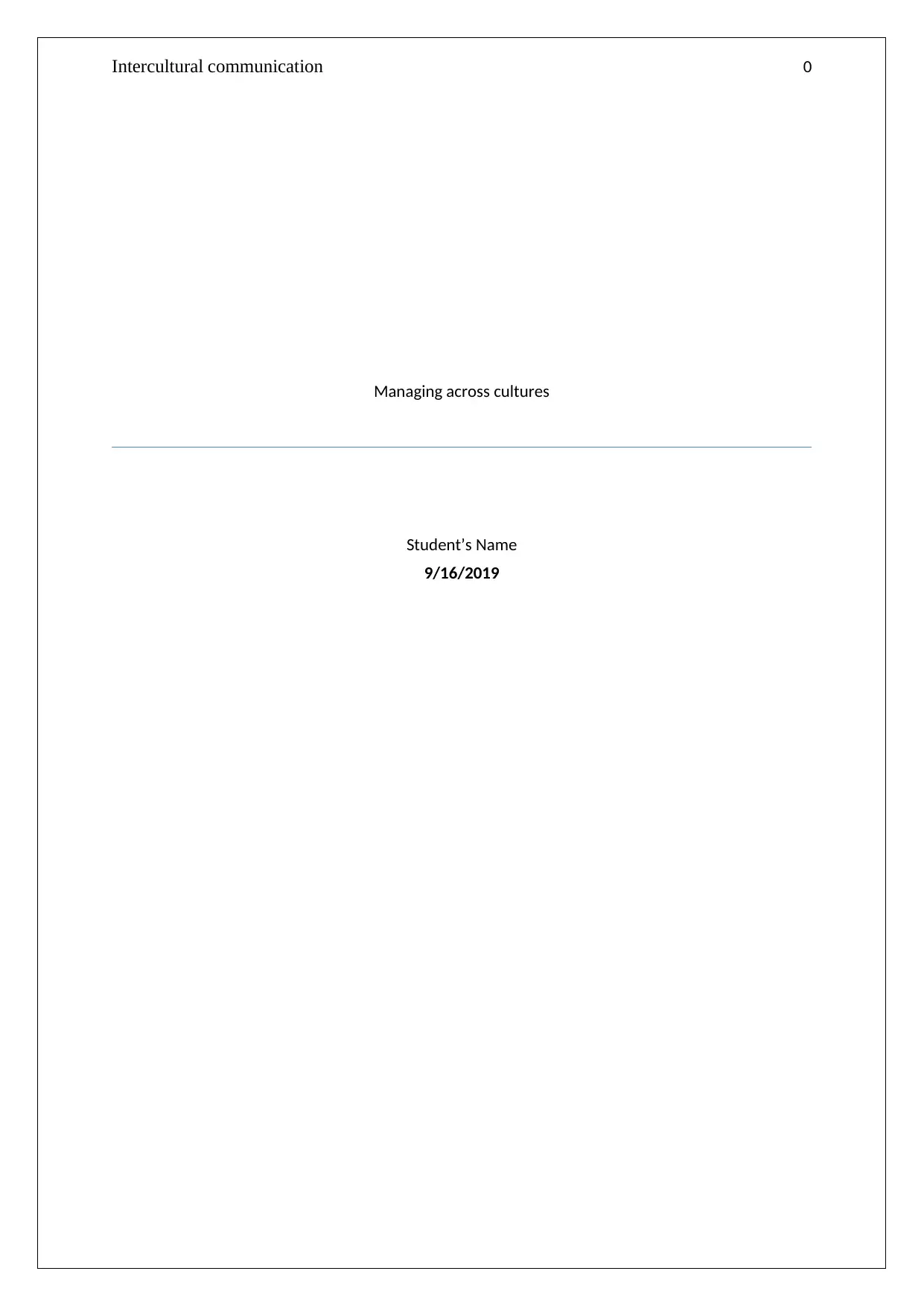
Intercultural communication 0
Managing across cultures
Student’s Name
9/16/2019
Managing across cultures
Student’s Name
9/16/2019
Paraphrase This Document
Need a fresh take? Get an instant paraphrase of this document with our AI Paraphraser
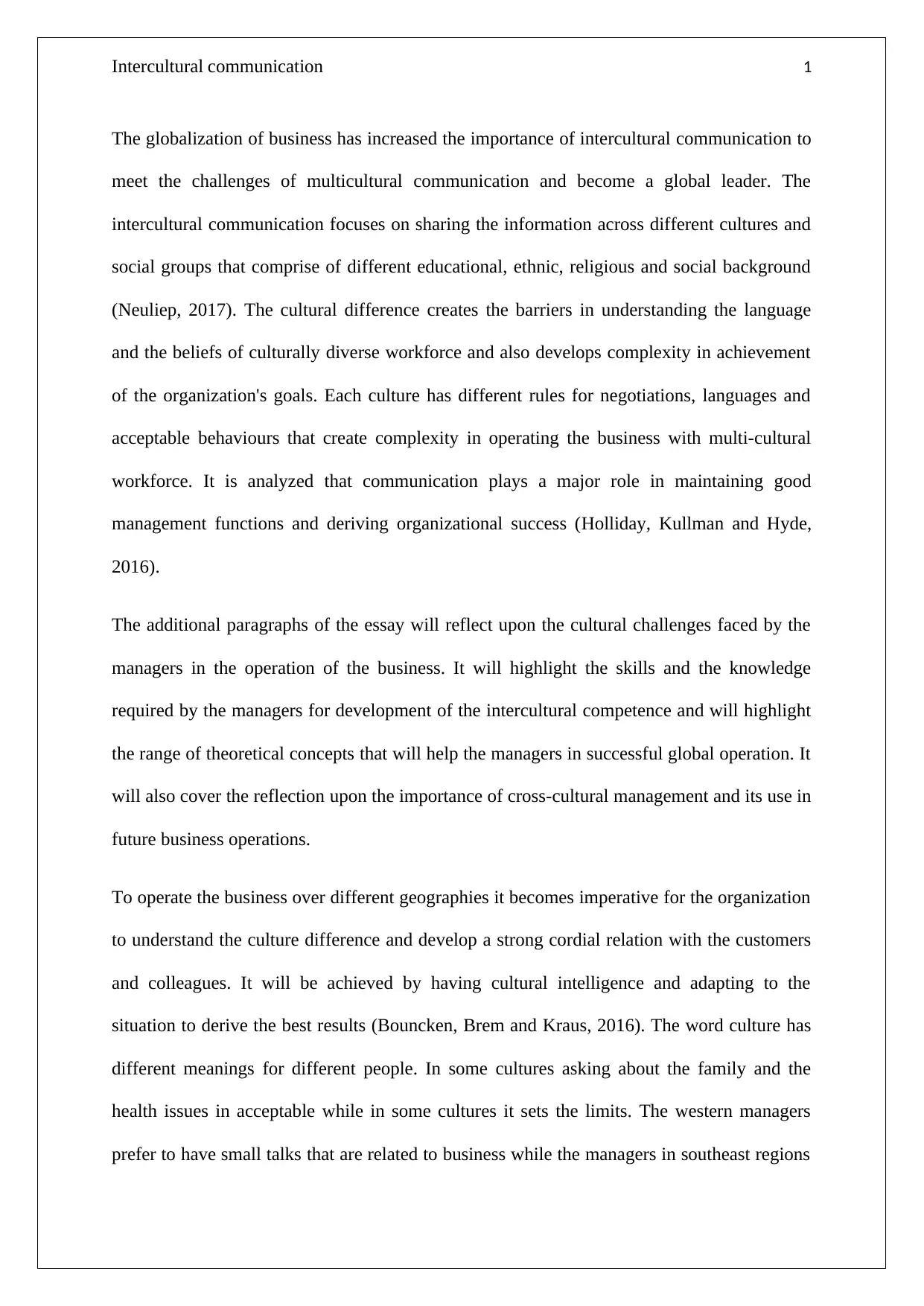
Intercultural communication 1
The globalization of business has increased the importance of intercultural communication to
meet the challenges of multicultural communication and become a global leader. The
intercultural communication focuses on sharing the information across different cultures and
social groups that comprise of different educational, ethnic, religious and social background
(Neuliep, 2017). The cultural difference creates the barriers in understanding the language
and the beliefs of culturally diverse workforce and also develops complexity in achievement
of the organization's goals. Each culture has different rules for negotiations, languages and
acceptable behaviours that create complexity in operating the business with multi-cultural
workforce. It is analyzed that communication plays a major role in maintaining good
management functions and deriving organizational success (Holliday, Kullman and Hyde,
2016).
The additional paragraphs of the essay will reflect upon the cultural challenges faced by the
managers in the operation of the business. It will highlight the skills and the knowledge
required by the managers for development of the intercultural competence and will highlight
the range of theoretical concepts that will help the managers in successful global operation. It
will also cover the reflection upon the importance of cross-cultural management and its use in
future business operations.
To operate the business over different geographies it becomes imperative for the organization
to understand the culture difference and develop a strong cordial relation with the customers
and colleagues. It will be achieved by having cultural intelligence and adapting to the
situation to derive the best results (Bouncken, Brem and Kraus, 2016). The word culture has
different meanings for different people. In some cultures asking about the family and the
health issues in acceptable while in some cultures it sets the limits. The western managers
prefer to have small talks that are related to business while the managers in southeast regions
The globalization of business has increased the importance of intercultural communication to
meet the challenges of multicultural communication and become a global leader. The
intercultural communication focuses on sharing the information across different cultures and
social groups that comprise of different educational, ethnic, religious and social background
(Neuliep, 2017). The cultural difference creates the barriers in understanding the language
and the beliefs of culturally diverse workforce and also develops complexity in achievement
of the organization's goals. Each culture has different rules for negotiations, languages and
acceptable behaviours that create complexity in operating the business with multi-cultural
workforce. It is analyzed that communication plays a major role in maintaining good
management functions and deriving organizational success (Holliday, Kullman and Hyde,
2016).
The additional paragraphs of the essay will reflect upon the cultural challenges faced by the
managers in the operation of the business. It will highlight the skills and the knowledge
required by the managers for development of the intercultural competence and will highlight
the range of theoretical concepts that will help the managers in successful global operation. It
will also cover the reflection upon the importance of cross-cultural management and its use in
future business operations.
To operate the business over different geographies it becomes imperative for the organization
to understand the culture difference and develop a strong cordial relation with the customers
and colleagues. It will be achieved by having cultural intelligence and adapting to the
situation to derive the best results (Bouncken, Brem and Kraus, 2016). The word culture has
different meanings for different people. In some cultures asking about the family and the
health issues in acceptable while in some cultures it sets the limits. The western managers
prefer to have small talks that are related to business while the managers in southeast regions
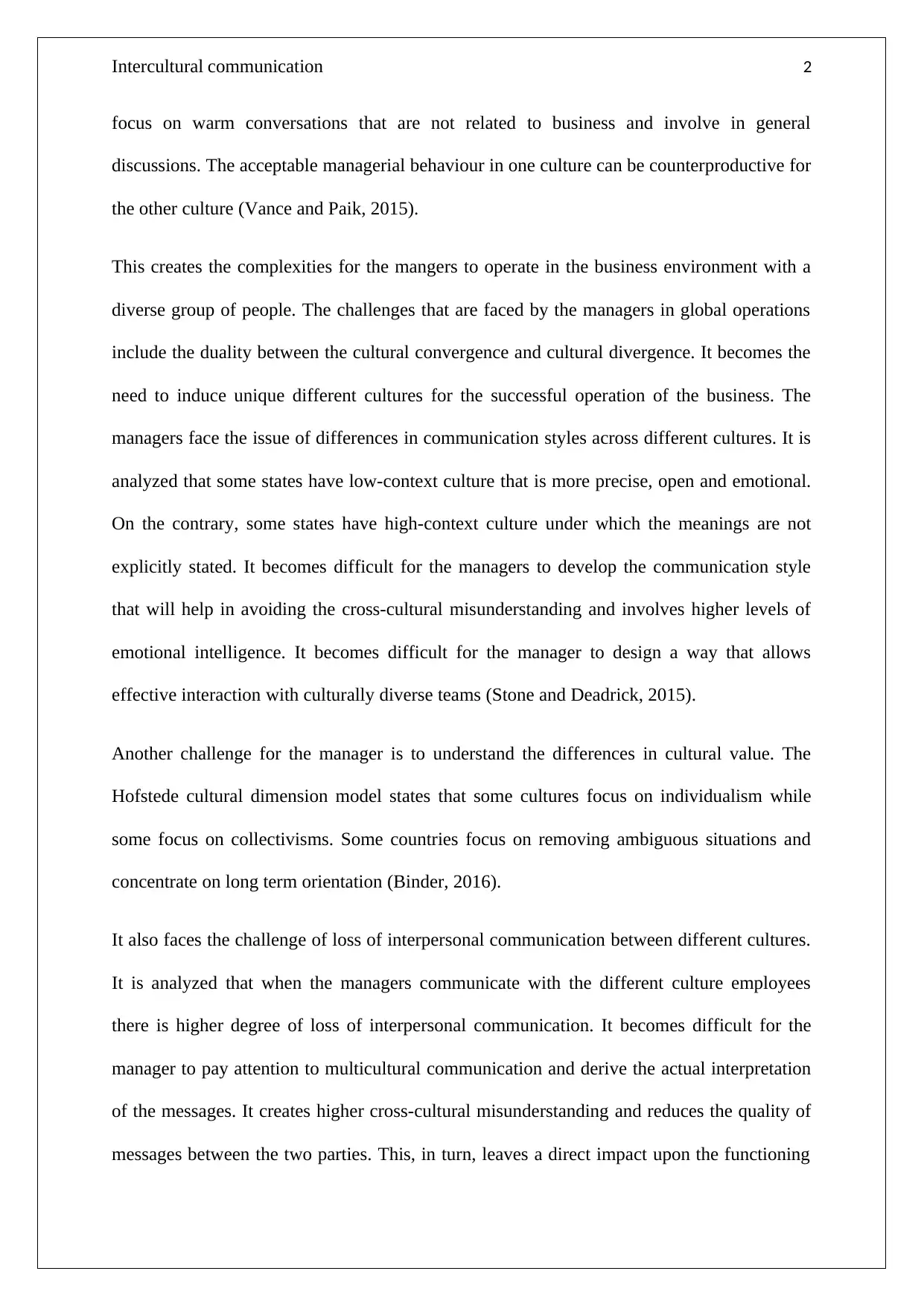
Intercultural communication 2
focus on warm conversations that are not related to business and involve in general
discussions. The acceptable managerial behaviour in one culture can be counterproductive for
the other culture (Vance and Paik, 2015).
This creates the complexities for the mangers to operate in the business environment with a
diverse group of people. The challenges that are faced by the managers in global operations
include the duality between the cultural convergence and cultural divergence. It becomes the
need to induce unique different cultures for the successful operation of the business. The
managers face the issue of differences in communication styles across different cultures. It is
analyzed that some states have low-context culture that is more precise, open and emotional.
On the contrary, some states have high-context culture under which the meanings are not
explicitly stated. It becomes difficult for the managers to develop the communication style
that will help in avoiding the cross-cultural misunderstanding and involves higher levels of
emotional intelligence. It becomes difficult for the manager to design a way that allows
effective interaction with culturally diverse teams (Stone and Deadrick, 2015).
Another challenge for the manager is to understand the differences in cultural value. The
Hofstede cultural dimension model states that some cultures focus on individualism while
some focus on collectivisms. Some countries focus on removing ambiguous situations and
concentrate on long term orientation (Binder, 2016).
It also faces the challenge of loss of interpersonal communication between different cultures.
It is analyzed that when the managers communicate with the different culture employees
there is higher degree of loss of interpersonal communication. It becomes difficult for the
manager to pay attention to multicultural communication and derive the actual interpretation
of the messages. It creates higher cross-cultural misunderstanding and reduces the quality of
messages between the two parties. This, in turn, leaves a direct impact upon the functioning
focus on warm conversations that are not related to business and involve in general
discussions. The acceptable managerial behaviour in one culture can be counterproductive for
the other culture (Vance and Paik, 2015).
This creates the complexities for the mangers to operate in the business environment with a
diverse group of people. The challenges that are faced by the managers in global operations
include the duality between the cultural convergence and cultural divergence. It becomes the
need to induce unique different cultures for the successful operation of the business. The
managers face the issue of differences in communication styles across different cultures. It is
analyzed that some states have low-context culture that is more precise, open and emotional.
On the contrary, some states have high-context culture under which the meanings are not
explicitly stated. It becomes difficult for the managers to develop the communication style
that will help in avoiding the cross-cultural misunderstanding and involves higher levels of
emotional intelligence. It becomes difficult for the manager to design a way that allows
effective interaction with culturally diverse teams (Stone and Deadrick, 2015).
Another challenge for the manager is to understand the differences in cultural value. The
Hofstede cultural dimension model states that some cultures focus on individualism while
some focus on collectivisms. Some countries focus on removing ambiguous situations and
concentrate on long term orientation (Binder, 2016).
It also faces the challenge of loss of interpersonal communication between different cultures.
It is analyzed that when the managers communicate with the different culture employees
there is higher degree of loss of interpersonal communication. It becomes difficult for the
manager to pay attention to multicultural communication and derive the actual interpretation
of the messages. It creates higher cross-cultural misunderstanding and reduces the quality of
messages between the two parties. This, in turn, leaves a direct impact upon the functioning
⊘ This is a preview!⊘
Do you want full access?
Subscribe today to unlock all pages.

Trusted by 1+ million students worldwide
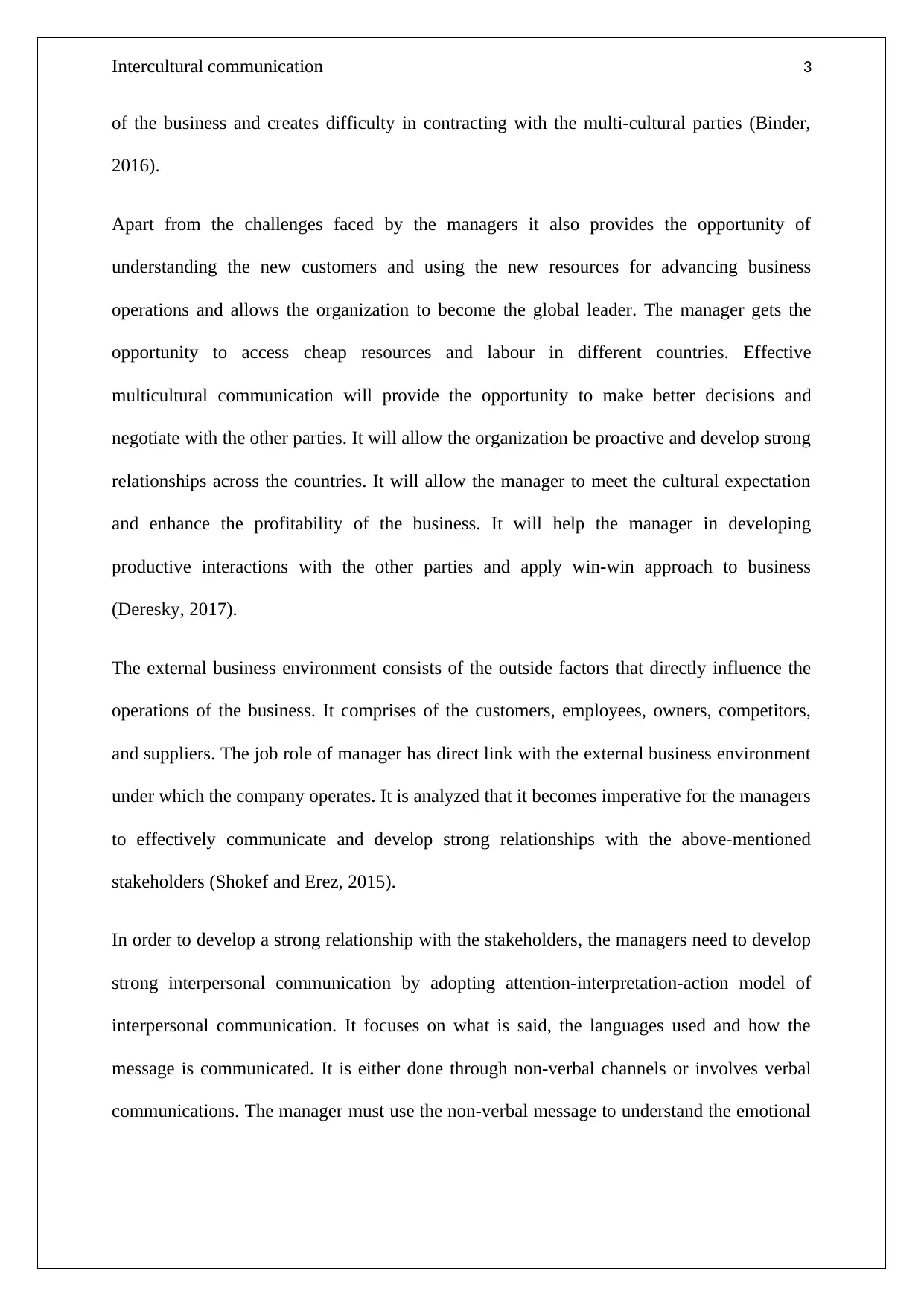
Intercultural communication 3
of the business and creates difficulty in contracting with the multi-cultural parties (Binder,
2016).
Apart from the challenges faced by the managers it also provides the opportunity of
understanding the new customers and using the new resources for advancing business
operations and allows the organization to become the global leader. The manager gets the
opportunity to access cheap resources and labour in different countries. Effective
multicultural communication will provide the opportunity to make better decisions and
negotiate with the other parties. It will allow the organization be proactive and develop strong
relationships across the countries. It will allow the manager to meet the cultural expectation
and enhance the profitability of the business. It will help the manager in developing
productive interactions with the other parties and apply win-win approach to business
(Deresky, 2017).
The external business environment consists of the outside factors that directly influence the
operations of the business. It comprises of the customers, employees, owners, competitors,
and suppliers. The job role of manager has direct link with the external business environment
under which the company operates. It is analyzed that it becomes imperative for the managers
to effectively communicate and develop strong relationships with the above-mentioned
stakeholders (Shokef and Erez, 2015).
In order to develop a strong relationship with the stakeholders, the managers need to develop
strong interpersonal communication by adopting attention-interpretation-action model of
interpersonal communication. It focuses on what is said, the languages used and how the
message is communicated. It is either done through non-verbal channels or involves verbal
communications. The manager must use the non-verbal message to understand the emotional
of the business and creates difficulty in contracting with the multi-cultural parties (Binder,
2016).
Apart from the challenges faced by the managers it also provides the opportunity of
understanding the new customers and using the new resources for advancing business
operations and allows the organization to become the global leader. The manager gets the
opportunity to access cheap resources and labour in different countries. Effective
multicultural communication will provide the opportunity to make better decisions and
negotiate with the other parties. It will allow the organization be proactive and develop strong
relationships across the countries. It will allow the manager to meet the cultural expectation
and enhance the profitability of the business. It will help the manager in developing
productive interactions with the other parties and apply win-win approach to business
(Deresky, 2017).
The external business environment consists of the outside factors that directly influence the
operations of the business. It comprises of the customers, employees, owners, competitors,
and suppliers. The job role of manager has direct link with the external business environment
under which the company operates. It is analyzed that it becomes imperative for the managers
to effectively communicate and develop strong relationships with the above-mentioned
stakeholders (Shokef and Erez, 2015).
In order to develop a strong relationship with the stakeholders, the managers need to develop
strong interpersonal communication by adopting attention-interpretation-action model of
interpersonal communication. It focuses on what is said, the languages used and how the
message is communicated. It is either done through non-verbal channels or involves verbal
communications. The manager must use the non-verbal message to understand the emotional
Paraphrase This Document
Need a fresh take? Get an instant paraphrase of this document with our AI Paraphraser
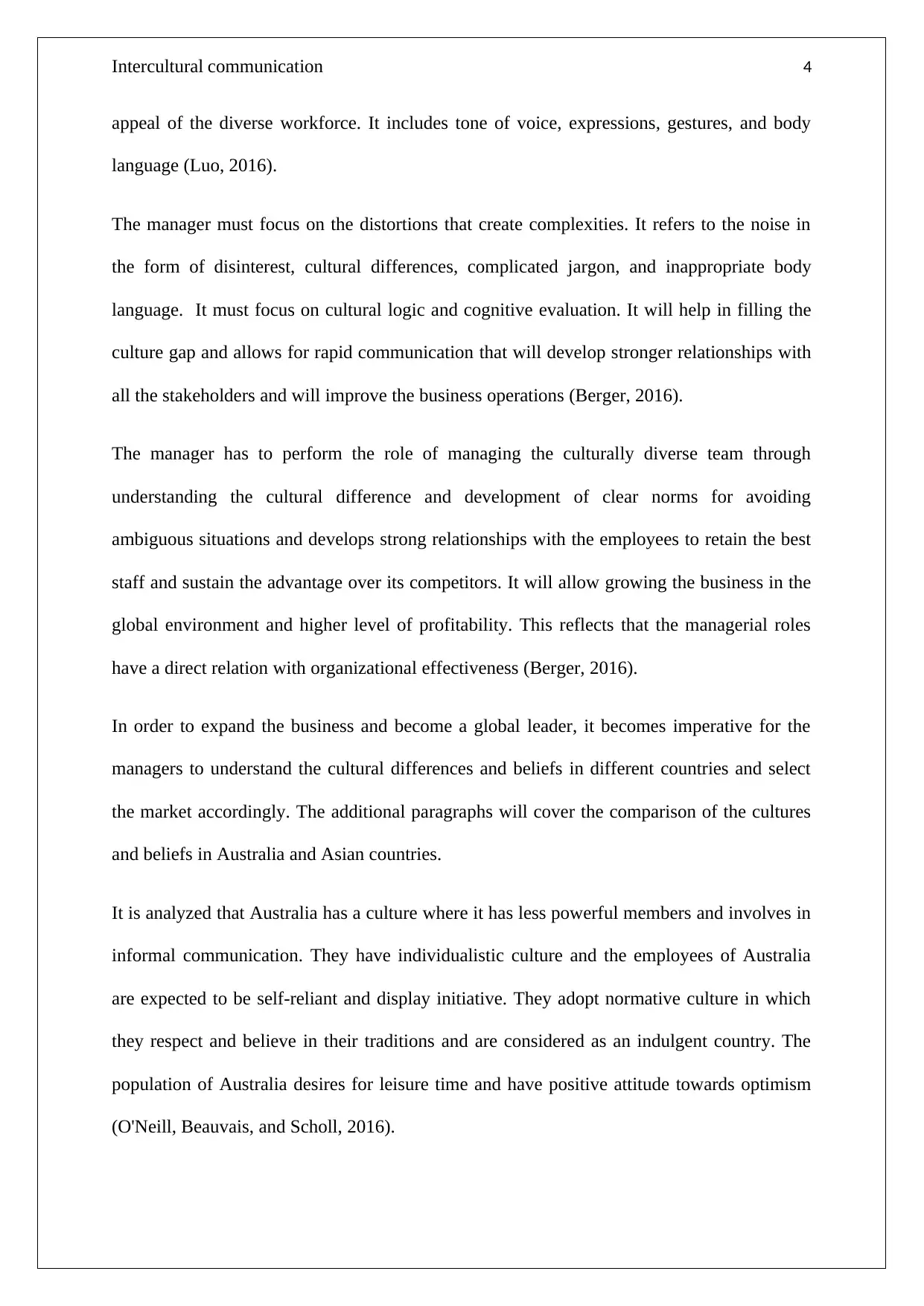
Intercultural communication 4
appeal of the diverse workforce. It includes tone of voice, expressions, gestures, and body
language (Luo, 2016).
The manager must focus on the distortions that create complexities. It refers to the noise in
the form of disinterest, cultural differences, complicated jargon, and inappropriate body
language. It must focus on cultural logic and cognitive evaluation. It will help in filling the
culture gap and allows for rapid communication that will develop stronger relationships with
all the stakeholders and will improve the business operations (Berger, 2016).
The manager has to perform the role of managing the culturally diverse team through
understanding the cultural difference and development of clear norms for avoiding
ambiguous situations and develops strong relationships with the employees to retain the best
staff and sustain the advantage over its competitors. It will allow growing the business in the
global environment and higher level of profitability. This reflects that the managerial roles
have a direct relation with organizational effectiveness (Berger, 2016).
In order to expand the business and become a global leader, it becomes imperative for the
managers to understand the cultural differences and beliefs in different countries and select
the market accordingly. The additional paragraphs will cover the comparison of the cultures
and beliefs in Australia and Asian countries.
It is analyzed that Australia has a culture where it has less powerful members and involves in
informal communication. They have individualistic culture and the employees of Australia
are expected to be self-reliant and display initiative. They adopt normative culture in which
they respect and believe in their traditions and are considered as an indulgent country. The
population of Australia desires for leisure time and have positive attitude towards optimism
(O'Neill, Beauvais, and Scholl, 2016).
appeal of the diverse workforce. It includes tone of voice, expressions, gestures, and body
language (Luo, 2016).
The manager must focus on the distortions that create complexities. It refers to the noise in
the form of disinterest, cultural differences, complicated jargon, and inappropriate body
language. It must focus on cultural logic and cognitive evaluation. It will help in filling the
culture gap and allows for rapid communication that will develop stronger relationships with
all the stakeholders and will improve the business operations (Berger, 2016).
The manager has to perform the role of managing the culturally diverse team through
understanding the cultural difference and development of clear norms for avoiding
ambiguous situations and develops strong relationships with the employees to retain the best
staff and sustain the advantage over its competitors. It will allow growing the business in the
global environment and higher level of profitability. This reflects that the managerial roles
have a direct relation with organizational effectiveness (Berger, 2016).
In order to expand the business and become a global leader, it becomes imperative for the
managers to understand the cultural differences and beliefs in different countries and select
the market accordingly. The additional paragraphs will cover the comparison of the cultures
and beliefs in Australia and Asian countries.
It is analyzed that Australia has a culture where it has less powerful members and involves in
informal communication. They have individualistic culture and the employees of Australia
are expected to be self-reliant and display initiative. They adopt normative culture in which
they respect and believe in their traditions and are considered as an indulgent country. The
population of Australia desires for leisure time and have positive attitude towards optimism
(O'Neill, Beauvais, and Scholl, 2016).
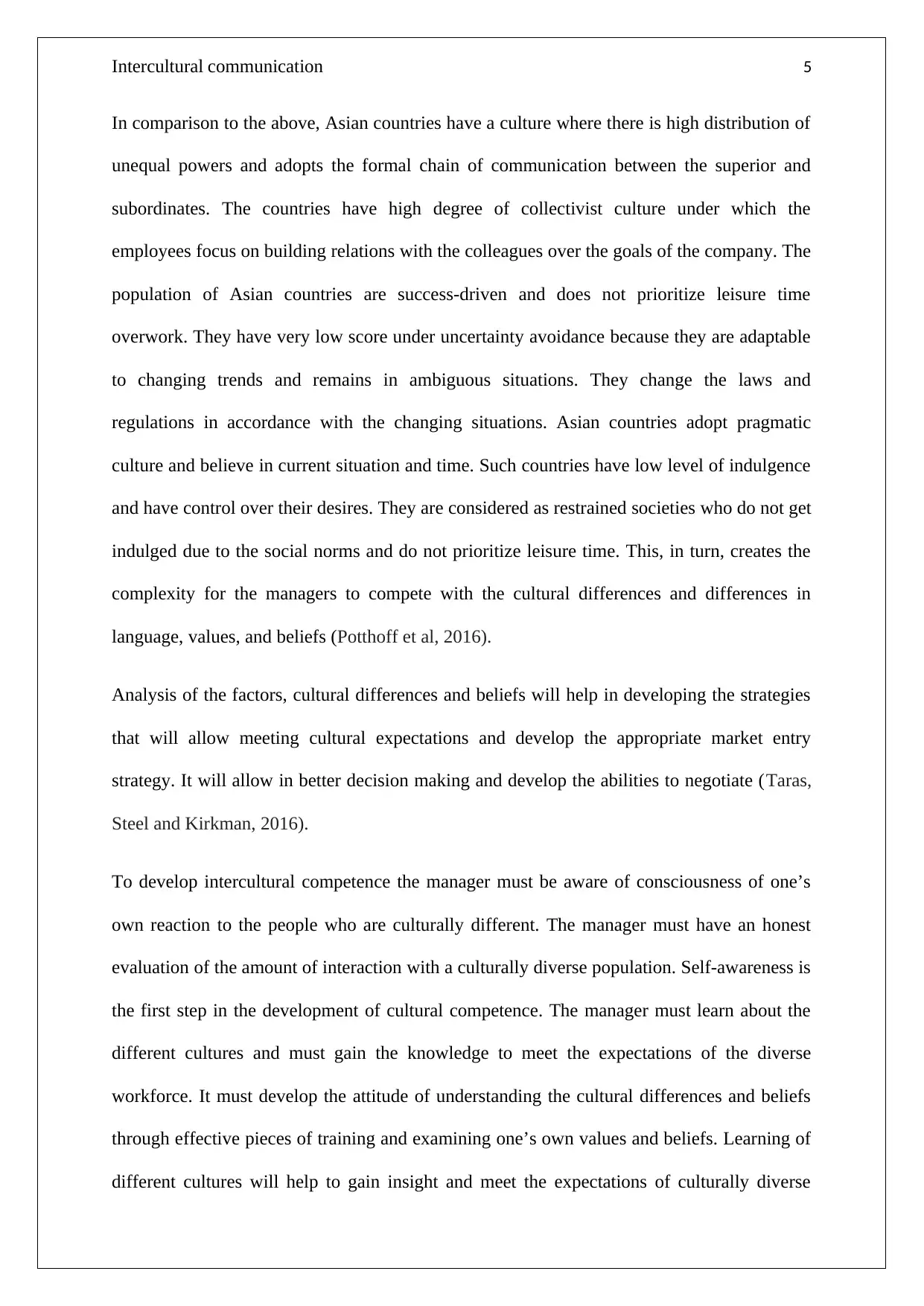
Intercultural communication 5
In comparison to the above, Asian countries have a culture where there is high distribution of
unequal powers and adopts the formal chain of communication between the superior and
subordinates. The countries have high degree of collectivist culture under which the
employees focus on building relations with the colleagues over the goals of the company. The
population of Asian countries are success-driven and does not prioritize leisure time
overwork. They have very low score under uncertainty avoidance because they are adaptable
to changing trends and remains in ambiguous situations. They change the laws and
regulations in accordance with the changing situations. Asian countries adopt pragmatic
culture and believe in current situation and time. Such countries have low level of indulgence
and have control over their desires. They are considered as restrained societies who do not get
indulged due to the social norms and do not prioritize leisure time. This, in turn, creates the
complexity for the managers to compete with the cultural differences and differences in
language, values, and beliefs (Potthoff et al, 2016).
Analysis of the factors, cultural differences and beliefs will help in developing the strategies
that will allow meeting cultural expectations and develop the appropriate market entry
strategy. It will allow in better decision making and develop the abilities to negotiate (Taras,
Steel and Kirkman, 2016).
To develop intercultural competence the manager must be aware of consciousness of one’s
own reaction to the people who are culturally different. The manager must have an honest
evaluation of the amount of interaction with a culturally diverse population. Self-awareness is
the first step in the development of cultural competence. The manager must learn about the
different cultures and must gain the knowledge to meet the expectations of the diverse
workforce. It must develop the attitude of understanding the cultural differences and beliefs
through effective pieces of training and examining one’s own values and beliefs. Learning of
different cultures will help to gain insight and meet the expectations of culturally diverse
In comparison to the above, Asian countries have a culture where there is high distribution of
unequal powers and adopts the formal chain of communication between the superior and
subordinates. The countries have high degree of collectivist culture under which the
employees focus on building relations with the colleagues over the goals of the company. The
population of Asian countries are success-driven and does not prioritize leisure time
overwork. They have very low score under uncertainty avoidance because they are adaptable
to changing trends and remains in ambiguous situations. They change the laws and
regulations in accordance with the changing situations. Asian countries adopt pragmatic
culture and believe in current situation and time. Such countries have low level of indulgence
and have control over their desires. They are considered as restrained societies who do not get
indulged due to the social norms and do not prioritize leisure time. This, in turn, creates the
complexity for the managers to compete with the cultural differences and differences in
language, values, and beliefs (Potthoff et al, 2016).
Analysis of the factors, cultural differences and beliefs will help in developing the strategies
that will allow meeting cultural expectations and develop the appropriate market entry
strategy. It will allow in better decision making and develop the abilities to negotiate (Taras,
Steel and Kirkman, 2016).
To develop intercultural competence the manager must be aware of consciousness of one’s
own reaction to the people who are culturally different. The manager must have an honest
evaluation of the amount of interaction with a culturally diverse population. Self-awareness is
the first step in the development of cultural competence. The manager must learn about the
different cultures and must gain the knowledge to meet the expectations of the diverse
workforce. It must develop the attitude of understanding the cultural differences and beliefs
through effective pieces of training and examining one’s own values and beliefs. Learning of
different cultures will help to gain insight and meet the expectations of culturally diverse
⊘ This is a preview!⊘
Do you want full access?
Subscribe today to unlock all pages.

Trusted by 1+ million students worldwide
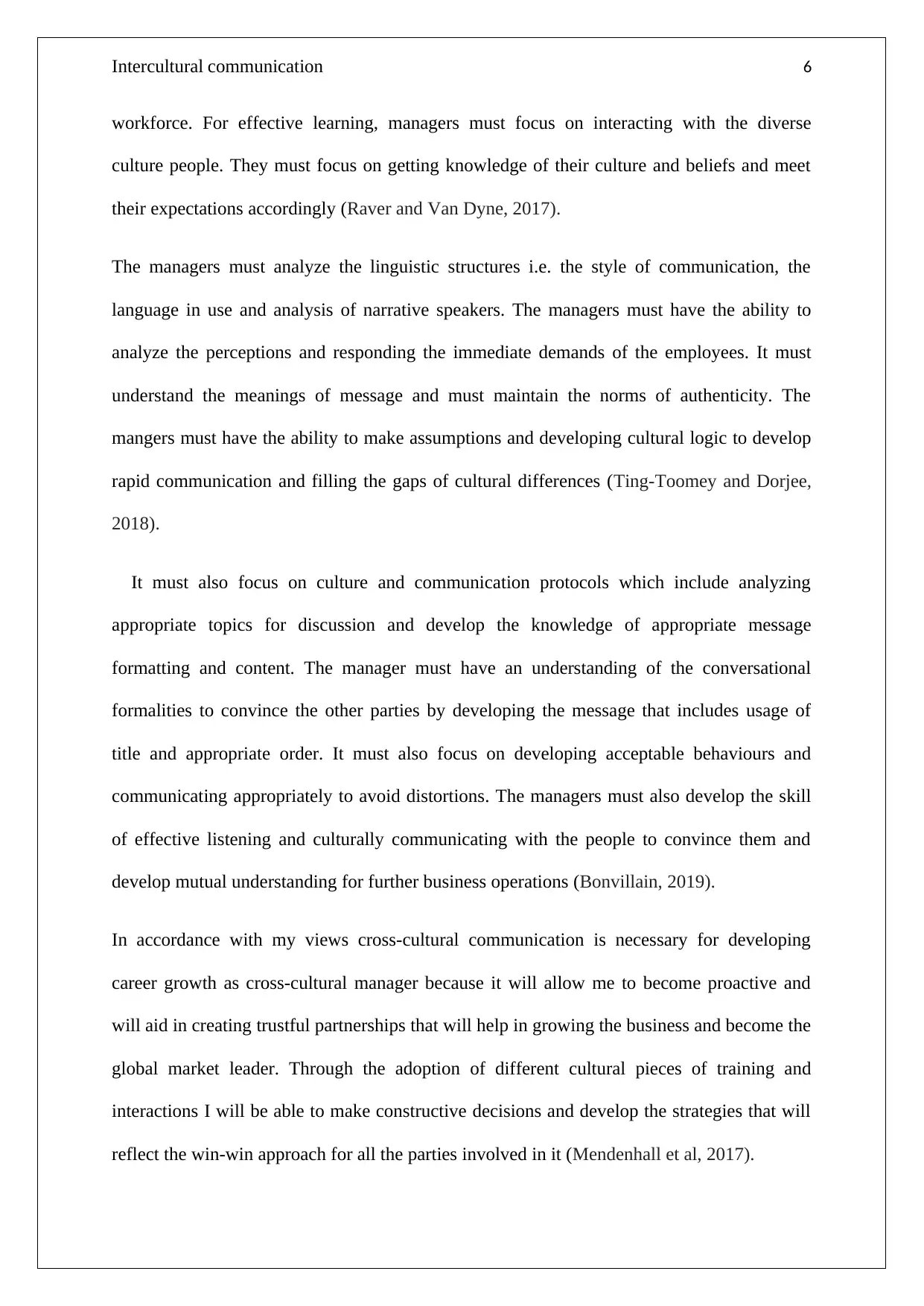
Intercultural communication 6
workforce. For effective learning, managers must focus on interacting with the diverse
culture people. They must focus on getting knowledge of their culture and beliefs and meet
their expectations accordingly (Raver and Van Dyne, 2017).
The managers must analyze the linguistic structures i.e. the style of communication, the
language in use and analysis of narrative speakers. The managers must have the ability to
analyze the perceptions and responding the immediate demands of the employees. It must
understand the meanings of message and must maintain the norms of authenticity. The
mangers must have the ability to make assumptions and developing cultural logic to develop
rapid communication and filling the gaps of cultural differences (Ting-Toomey and Dorjee,
2018).
It must also focus on culture and communication protocols which include analyzing
appropriate topics for discussion and develop the knowledge of appropriate message
formatting and content. The manager must have an understanding of the conversational
formalities to convince the other parties by developing the message that includes usage of
title and appropriate order. It must also focus on developing acceptable behaviours and
communicating appropriately to avoid distortions. The managers must also develop the skill
of effective listening and culturally communicating with the people to convince them and
develop mutual understanding for further business operations (Bonvillain, 2019).
In accordance with my views cross-cultural communication is necessary for developing
career growth as cross-cultural manager because it will allow me to become proactive and
will aid in creating trustful partnerships that will help in growing the business and become the
global market leader. Through the adoption of different cultural pieces of training and
interactions I will be able to make constructive decisions and develop the strategies that will
reflect the win-win approach for all the parties involved in it (Mendenhall et al, 2017).
workforce. For effective learning, managers must focus on interacting with the diverse
culture people. They must focus on getting knowledge of their culture and beliefs and meet
their expectations accordingly (Raver and Van Dyne, 2017).
The managers must analyze the linguistic structures i.e. the style of communication, the
language in use and analysis of narrative speakers. The managers must have the ability to
analyze the perceptions and responding the immediate demands of the employees. It must
understand the meanings of message and must maintain the norms of authenticity. The
mangers must have the ability to make assumptions and developing cultural logic to develop
rapid communication and filling the gaps of cultural differences (Ting-Toomey and Dorjee,
2018).
It must also focus on culture and communication protocols which include analyzing
appropriate topics for discussion and develop the knowledge of appropriate message
formatting and content. The manager must have an understanding of the conversational
formalities to convince the other parties by developing the message that includes usage of
title and appropriate order. It must also focus on developing acceptable behaviours and
communicating appropriately to avoid distortions. The managers must also develop the skill
of effective listening and culturally communicating with the people to convince them and
develop mutual understanding for further business operations (Bonvillain, 2019).
In accordance with my views cross-cultural communication is necessary for developing
career growth as cross-cultural manager because it will allow me to become proactive and
will aid in creating trustful partnerships that will help in growing the business and become the
global market leader. Through the adoption of different cultural pieces of training and
interactions I will be able to make constructive decisions and develop the strategies that will
reflect the win-win approach for all the parties involved in it (Mendenhall et al, 2017).
Paraphrase This Document
Need a fresh take? Get an instant paraphrase of this document with our AI Paraphraser
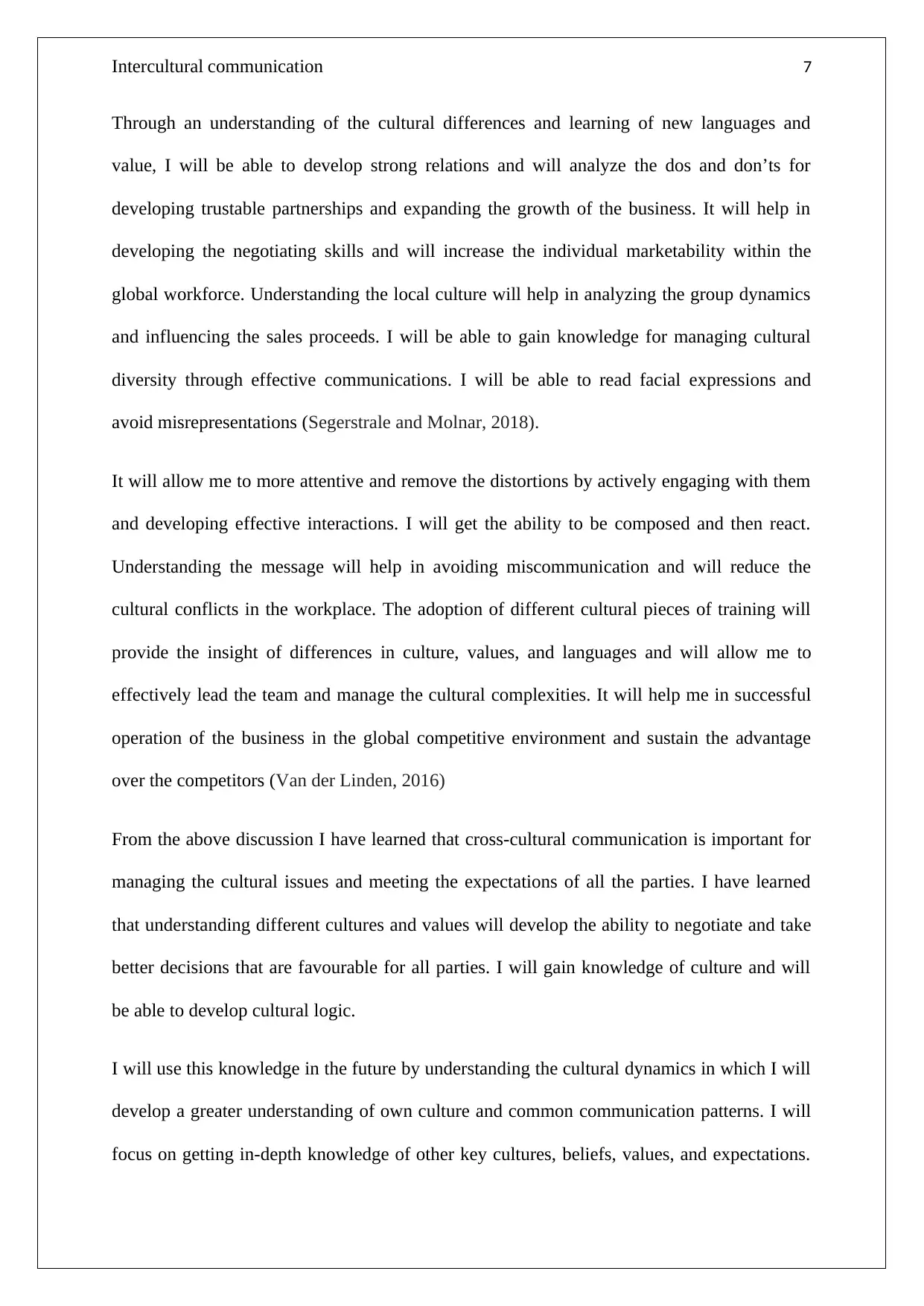
Intercultural communication 7
Through an understanding of the cultural differences and learning of new languages and
value, I will be able to develop strong relations and will analyze the dos and don’ts for
developing trustable partnerships and expanding the growth of the business. It will help in
developing the negotiating skills and will increase the individual marketability within the
global workforce. Understanding the local culture will help in analyzing the group dynamics
and influencing the sales proceeds. I will be able to gain knowledge for managing cultural
diversity through effective communications. I will be able to read facial expressions and
avoid misrepresentations (Segerstrale and Molnar, 2018).
It will allow me to more attentive and remove the distortions by actively engaging with them
and developing effective interactions. I will get the ability to be composed and then react.
Understanding the message will help in avoiding miscommunication and will reduce the
cultural conflicts in the workplace. The adoption of different cultural pieces of training will
provide the insight of differences in culture, values, and languages and will allow me to
effectively lead the team and manage the cultural complexities. It will help me in successful
operation of the business in the global competitive environment and sustain the advantage
over the competitors (Van der Linden, 2016)
From the above discussion I have learned that cross-cultural communication is important for
managing the cultural issues and meeting the expectations of all the parties. I have learned
that understanding different cultures and values will develop the ability to negotiate and take
better decisions that are favourable for all parties. I will gain knowledge of culture and will
be able to develop cultural logic.
I will use this knowledge in the future by understanding the cultural dynamics in which I will
develop a greater understanding of own culture and common communication patterns. I will
focus on getting in-depth knowledge of other key cultures, beliefs, values, and expectations.
Through an understanding of the cultural differences and learning of new languages and
value, I will be able to develop strong relations and will analyze the dos and don’ts for
developing trustable partnerships and expanding the growth of the business. It will help in
developing the negotiating skills and will increase the individual marketability within the
global workforce. Understanding the local culture will help in analyzing the group dynamics
and influencing the sales proceeds. I will be able to gain knowledge for managing cultural
diversity through effective communications. I will be able to read facial expressions and
avoid misrepresentations (Segerstrale and Molnar, 2018).
It will allow me to more attentive and remove the distortions by actively engaging with them
and developing effective interactions. I will get the ability to be composed and then react.
Understanding the message will help in avoiding miscommunication and will reduce the
cultural conflicts in the workplace. The adoption of different cultural pieces of training will
provide the insight of differences in culture, values, and languages and will allow me to
effectively lead the team and manage the cultural complexities. It will help me in successful
operation of the business in the global competitive environment and sustain the advantage
over the competitors (Van der Linden, 2016)
From the above discussion I have learned that cross-cultural communication is important for
managing the cultural issues and meeting the expectations of all the parties. I have learned
that understanding different cultures and values will develop the ability to negotiate and take
better decisions that are favourable for all parties. I will gain knowledge of culture and will
be able to develop cultural logic.
I will use this knowledge in the future by understanding the cultural dynamics in which I will
develop a greater understanding of own culture and common communication patterns. I will
focus on getting in-depth knowledge of other key cultures, beliefs, values, and expectations.
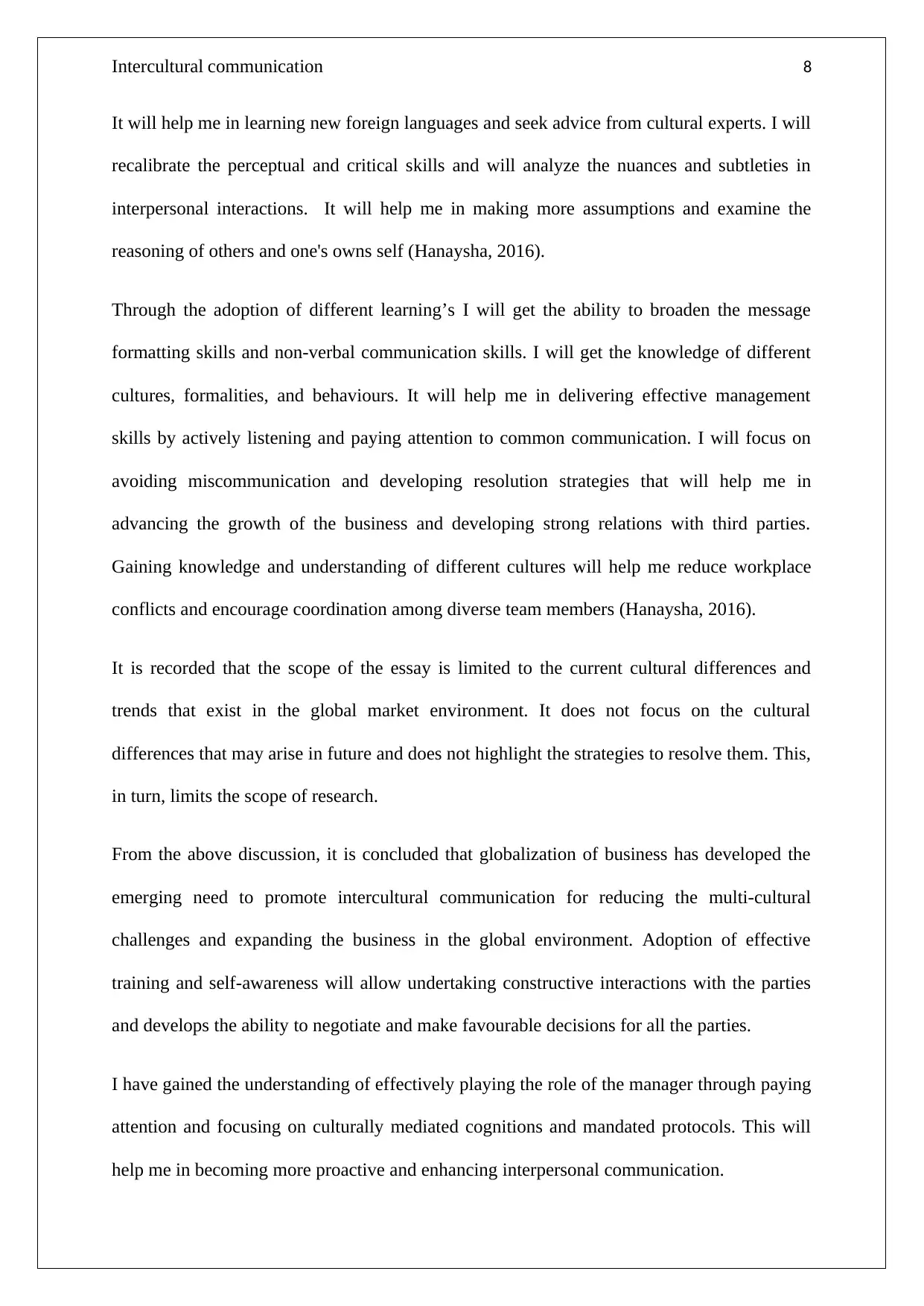
Intercultural communication 8
It will help me in learning new foreign languages and seek advice from cultural experts. I will
recalibrate the perceptual and critical skills and will analyze the nuances and subtleties in
interpersonal interactions. It will help me in making more assumptions and examine the
reasoning of others and one's owns self (Hanaysha, 2016).
Through the adoption of different learning’s I will get the ability to broaden the message
formatting skills and non-verbal communication skills. I will get the knowledge of different
cultures, formalities, and behaviours. It will help me in delivering effective management
skills by actively listening and paying attention to common communication. I will focus on
avoiding miscommunication and developing resolution strategies that will help me in
advancing the growth of the business and developing strong relations with third parties.
Gaining knowledge and understanding of different cultures will help me reduce workplace
conflicts and encourage coordination among diverse team members (Hanaysha, 2016).
It is recorded that the scope of the essay is limited to the current cultural differences and
trends that exist in the global market environment. It does not focus on the cultural
differences that may arise in future and does not highlight the strategies to resolve them. This,
in turn, limits the scope of research.
From the above discussion, it is concluded that globalization of business has developed the
emerging need to promote intercultural communication for reducing the multi-cultural
challenges and expanding the business in the global environment. Adoption of effective
training and self-awareness will allow undertaking constructive interactions with the parties
and develops the ability to negotiate and make favourable decisions for all the parties.
I have gained the understanding of effectively playing the role of the manager through paying
attention and focusing on culturally mediated cognitions and mandated protocols. This will
help me in becoming more proactive and enhancing interpersonal communication.
It will help me in learning new foreign languages and seek advice from cultural experts. I will
recalibrate the perceptual and critical skills and will analyze the nuances and subtleties in
interpersonal interactions. It will help me in making more assumptions and examine the
reasoning of others and one's owns self (Hanaysha, 2016).
Through the adoption of different learning’s I will get the ability to broaden the message
formatting skills and non-verbal communication skills. I will get the knowledge of different
cultures, formalities, and behaviours. It will help me in delivering effective management
skills by actively listening and paying attention to common communication. I will focus on
avoiding miscommunication and developing resolution strategies that will help me in
advancing the growth of the business and developing strong relations with third parties.
Gaining knowledge and understanding of different cultures will help me reduce workplace
conflicts and encourage coordination among diverse team members (Hanaysha, 2016).
It is recorded that the scope of the essay is limited to the current cultural differences and
trends that exist in the global market environment. It does not focus on the cultural
differences that may arise in future and does not highlight the strategies to resolve them. This,
in turn, limits the scope of research.
From the above discussion, it is concluded that globalization of business has developed the
emerging need to promote intercultural communication for reducing the multi-cultural
challenges and expanding the business in the global environment. Adoption of effective
training and self-awareness will allow undertaking constructive interactions with the parties
and develops the ability to negotiate and make favourable decisions for all the parties.
I have gained the understanding of effectively playing the role of the manager through paying
attention and focusing on culturally mediated cognitions and mandated protocols. This will
help me in becoming more proactive and enhancing interpersonal communication.
⊘ This is a preview!⊘
Do you want full access?
Subscribe today to unlock all pages.

Trusted by 1+ million students worldwide
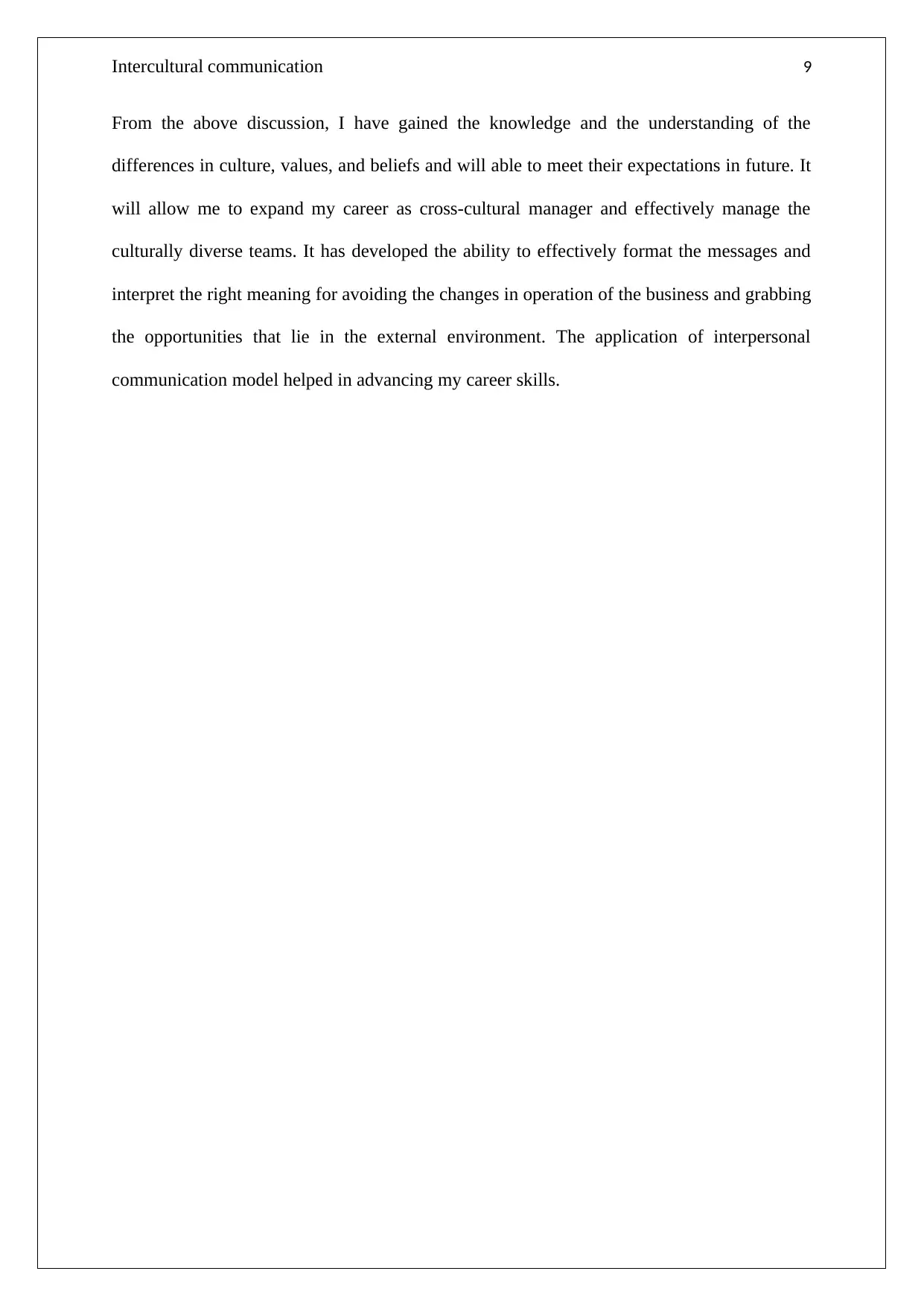
Intercultural communication 9
From the above discussion, I have gained the knowledge and the understanding of the
differences in culture, values, and beliefs and will able to meet their expectations in future. It
will allow me to expand my career as cross-cultural manager and effectively manage the
culturally diverse teams. It has developed the ability to effectively format the messages and
interpret the right meaning for avoiding the changes in operation of the business and grabbing
the opportunities that lie in the external environment. The application of interpersonal
communication model helped in advancing my career skills.
From the above discussion, I have gained the knowledge and the understanding of the
differences in culture, values, and beliefs and will able to meet their expectations in future. It
will allow me to expand my career as cross-cultural manager and effectively manage the
culturally diverse teams. It has developed the ability to effectively format the messages and
interpret the right meaning for avoiding the changes in operation of the business and grabbing
the opportunities that lie in the external environment. The application of interpersonal
communication model helped in advancing my career skills.
Paraphrase This Document
Need a fresh take? Get an instant paraphrase of this document with our AI Paraphraser
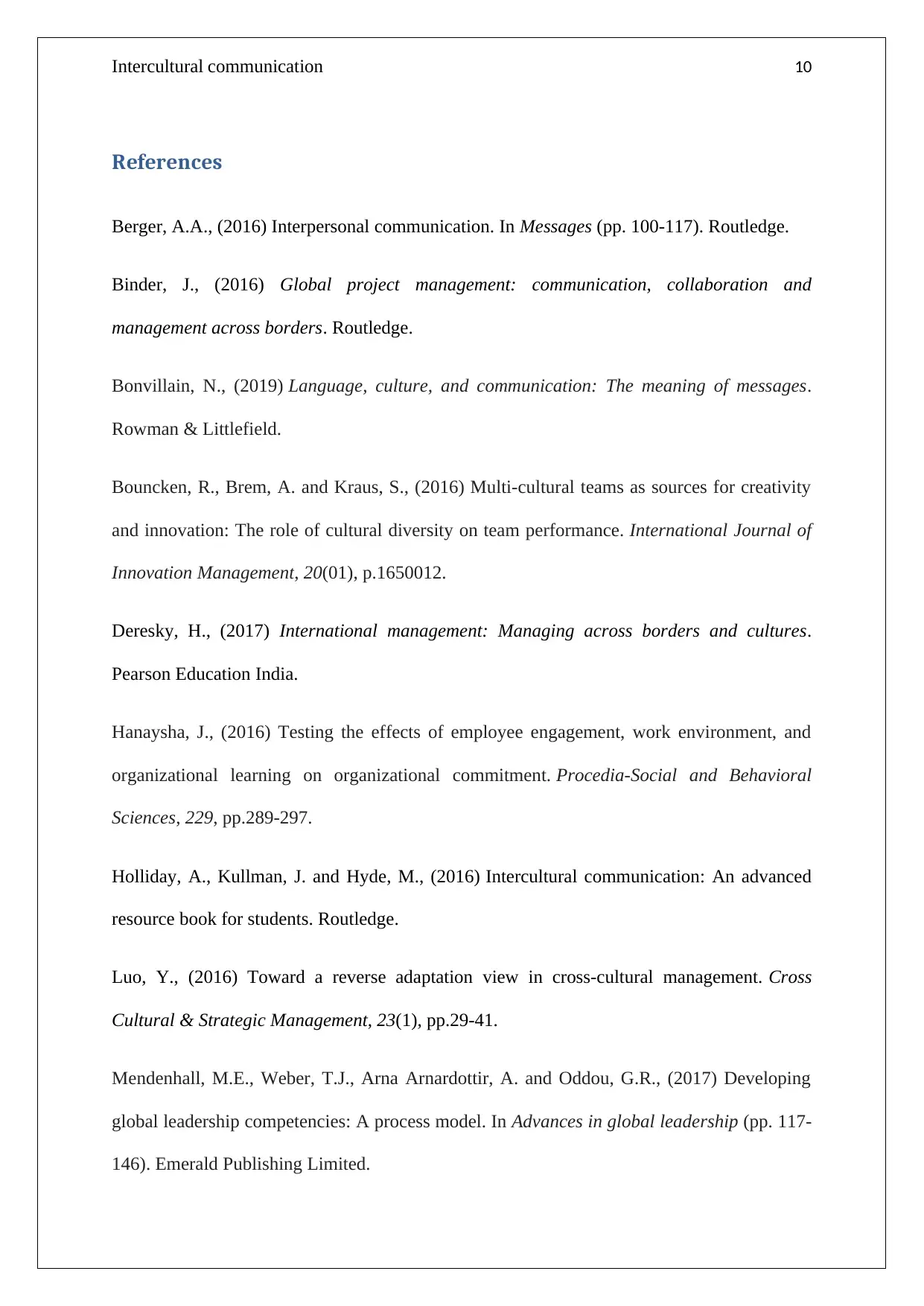
Intercultural communication 10
References
Berger, A.A., (2016) Interpersonal communication. In Messages (pp. 100-117). Routledge.
Binder, J., (2016) Global project management: communication, collaboration and
management across borders. Routledge.
Bonvillain, N., (2019) Language, culture, and communication: The meaning of messages.
Rowman & Littlefield.
Bouncken, R., Brem, A. and Kraus, S., (2016) Multi-cultural teams as sources for creativity
and innovation: The role of cultural diversity on team performance. International Journal of
Innovation Management, 20(01), p.1650012.
Deresky, H., (2017) International management: Managing across borders and cultures.
Pearson Education India.
Hanaysha, J., (2016) Testing the effects of employee engagement, work environment, and
organizational learning on organizational commitment. Procedia-Social and Behavioral
Sciences, 229, pp.289-297.
Holliday, A., Kullman, J. and Hyde, M., (2016) Intercultural communication: An advanced
resource book for students. Routledge.
Luo, Y., (2016) Toward a reverse adaptation view in cross-cultural management. Cross
Cultural & Strategic Management, 23(1), pp.29-41.
Mendenhall, M.E., Weber, T.J., Arna Arnardottir, A. and Oddou, G.R., (2017) Developing
global leadership competencies: A process model. In Advances in global leadership (pp. 117-
146). Emerald Publishing Limited.
References
Berger, A.A., (2016) Interpersonal communication. In Messages (pp. 100-117). Routledge.
Binder, J., (2016) Global project management: communication, collaboration and
management across borders. Routledge.
Bonvillain, N., (2019) Language, culture, and communication: The meaning of messages.
Rowman & Littlefield.
Bouncken, R., Brem, A. and Kraus, S., (2016) Multi-cultural teams as sources for creativity
and innovation: The role of cultural diversity on team performance. International Journal of
Innovation Management, 20(01), p.1650012.
Deresky, H., (2017) International management: Managing across borders and cultures.
Pearson Education India.
Hanaysha, J., (2016) Testing the effects of employee engagement, work environment, and
organizational learning on organizational commitment. Procedia-Social and Behavioral
Sciences, 229, pp.289-297.
Holliday, A., Kullman, J. and Hyde, M., (2016) Intercultural communication: An advanced
resource book for students. Routledge.
Luo, Y., (2016) Toward a reverse adaptation view in cross-cultural management. Cross
Cultural & Strategic Management, 23(1), pp.29-41.
Mendenhall, M.E., Weber, T.J., Arna Arnardottir, A. and Oddou, G.R., (2017) Developing
global leadership competencies: A process model. In Advances in global leadership (pp. 117-
146). Emerald Publishing Limited.
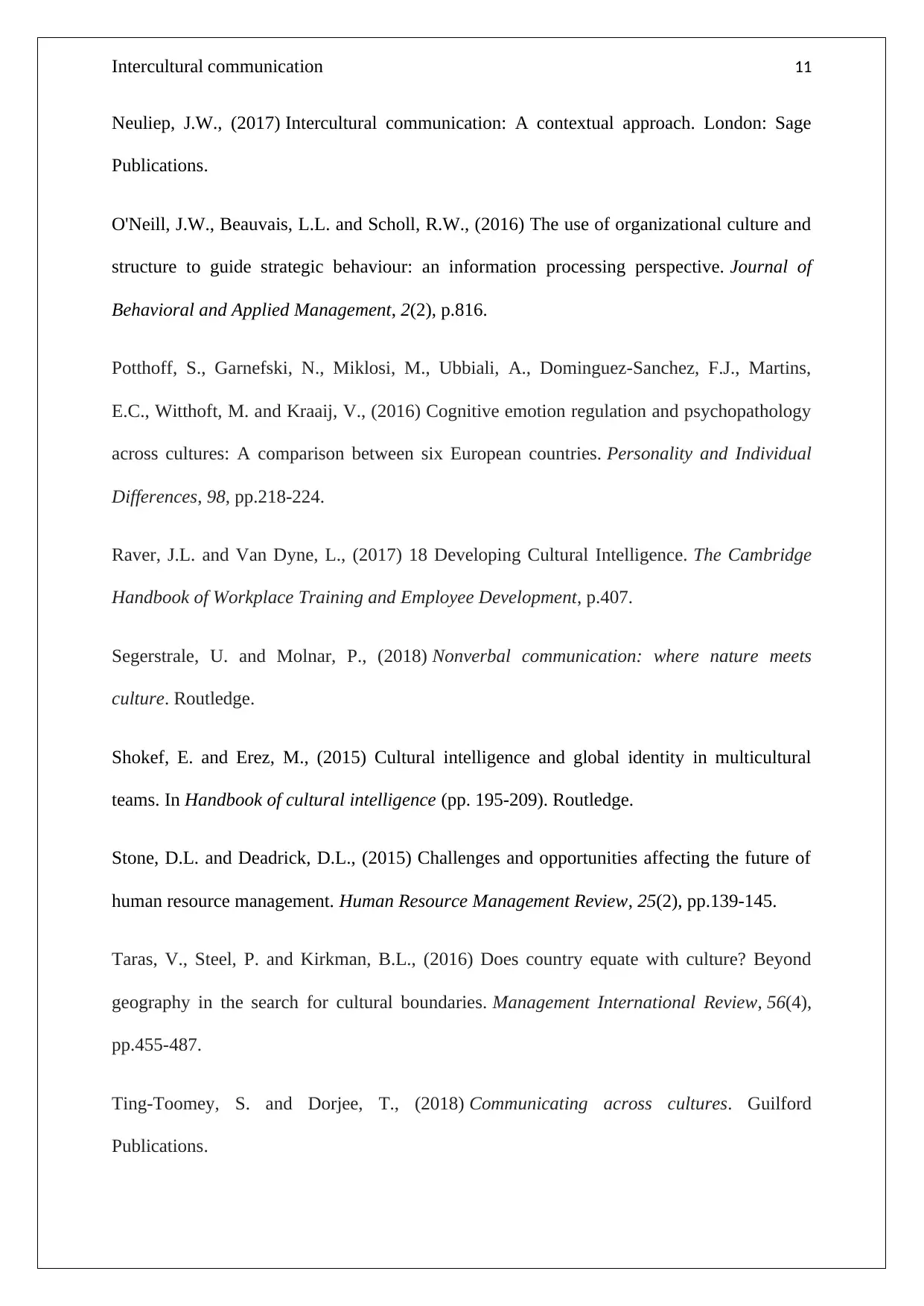
Intercultural communication 11
Neuliep, J.W., (2017) Intercultural communication: A contextual approach. London: Sage
Publications.
O'Neill, J.W., Beauvais, L.L. and Scholl, R.W., (2016) The use of organizational culture and
structure to guide strategic behaviour: an information processing perspective. Journal of
Behavioral and Applied Management, 2(2), p.816.
Potthoff, S., Garnefski, N., Miklosi, M., Ubbiali, A., Dominguez-Sanchez, F.J., Martins,
E.C., Witthoft, M. and Kraaij, V., (2016) Cognitive emotion regulation and psychopathology
across cultures: A comparison between six European countries. Personality and Individual
Differences, 98, pp.218-224.
Raver, J.L. and Van Dyne, L., (2017) 18 Developing Cultural Intelligence. The Cambridge
Handbook of Workplace Training and Employee Development, p.407.
Segerstrale, U. and Molnar, P., (2018) Nonverbal communication: where nature meets
culture. Routledge.
Shokef, E. and Erez, M., (2015) Cultural intelligence and global identity in multicultural
teams. In Handbook of cultural intelligence (pp. 195-209). Routledge.
Stone, D.L. and Deadrick, D.L., (2015) Challenges and opportunities affecting the future of
human resource management. Human Resource Management Review, 25(2), pp.139-145.
Taras, V., Steel, P. and Kirkman, B.L., (2016) Does country equate with culture? Beyond
geography in the search for cultural boundaries. Management International Review, 56(4),
pp.455-487.
Ting-Toomey, S. and Dorjee, T., (2018) Communicating across cultures. Guilford
Publications.
Neuliep, J.W., (2017) Intercultural communication: A contextual approach. London: Sage
Publications.
O'Neill, J.W., Beauvais, L.L. and Scholl, R.W., (2016) The use of organizational culture and
structure to guide strategic behaviour: an information processing perspective. Journal of
Behavioral and Applied Management, 2(2), p.816.
Potthoff, S., Garnefski, N., Miklosi, M., Ubbiali, A., Dominguez-Sanchez, F.J., Martins,
E.C., Witthoft, M. and Kraaij, V., (2016) Cognitive emotion regulation and psychopathology
across cultures: A comparison between six European countries. Personality and Individual
Differences, 98, pp.218-224.
Raver, J.L. and Van Dyne, L., (2017) 18 Developing Cultural Intelligence. The Cambridge
Handbook of Workplace Training and Employee Development, p.407.
Segerstrale, U. and Molnar, P., (2018) Nonverbal communication: where nature meets
culture. Routledge.
Shokef, E. and Erez, M., (2015) Cultural intelligence and global identity in multicultural
teams. In Handbook of cultural intelligence (pp. 195-209). Routledge.
Stone, D.L. and Deadrick, D.L., (2015) Challenges and opportunities affecting the future of
human resource management. Human Resource Management Review, 25(2), pp.139-145.
Taras, V., Steel, P. and Kirkman, B.L., (2016) Does country equate with culture? Beyond
geography in the search for cultural boundaries. Management International Review, 56(4),
pp.455-487.
Ting-Toomey, S. and Dorjee, T., (2018) Communicating across cultures. Guilford
Publications.
⊘ This is a preview!⊘
Do you want full access?
Subscribe today to unlock all pages.

Trusted by 1+ million students worldwide
1 out of 13
Related Documents
Your All-in-One AI-Powered Toolkit for Academic Success.
+13062052269
info@desklib.com
Available 24*7 on WhatsApp / Email
![[object Object]](/_next/static/media/star-bottom.7253800d.svg)
Unlock your academic potential
Copyright © 2020–2026 A2Z Services. All Rights Reserved. Developed and managed by ZUCOL.




